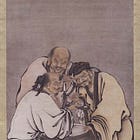Related post:
For full citations of abbreviated references, please see Introduction and Bibliography.
Gurdjieff told the Rope group that sugar was cheap, in comparison with "divine starch," which could give everything.1 Yet, he was known in certain quarters as "Monsieur Bonbon,"2 as in later life he is frequently described as handing out sweets in the streets of Paris as well as at home.3 Some thought he was a marchand de bonbons.4 What his reasons for this practice were are difficult to know in totality, and he may have had different reasons in different contexts - for example, to see children smile,5 to disarm customs officials,6 to give an embarrassing task,7 to bring the child (deeply hidden within the adult) to the fore. It could symbolise a reward or payment. It may have been to change the state, or simply to feel pleasure himself in the giving of sweets.
On Thursday August 26, 1943, the following conversation between Gurdjieff and a doctor in his Paris group is recorded:
THE DOCTOR: We are egotistic by nature.
GURDJIEFF: Excuse me. You are egotistic; most people are not. I, for example, automatically experience pleasure when I can do good for others. For example, you have noticed that I always have bonbons with me. It is my specialty. I give some to everybody. They are not for me. I don't like them. It costs me a lot. Sometimes I give away five kilos in one day. And that costs maybe a thousand francs a kilo. Wherever I go, all the children know me well. With a single bonbon, what satisfaction one can give! It is extraordinary.8
Gurdjieff pays for the satisfaction he can give, and it costs him a lot - a dissatisfaction. Yet, he also receives a payment in that he would “automatically experience pleasure.” Sugar may not literally be thought of as a “good for others,” but the change in state engendered thereby, from the kindly gift of Monsieur Bonbon, may have appeared, as it were, heaven-sent.
Gurdjieff and the Women of the Rope, p.149.
E.g., see essay by P. L. Travers - George Ivanovitch Gurdjieff (1877–1949), which can be found in Gurdjieff International Review.
E.g., C.S. Nott, Teachings of Gurdjieff, p.80.
Gurdjieff and the Women of the Rope, p.122.
E.g., J.G. & E. Bennett - Idiots in Paris, p.17.
Gurdjieff and the Women of the Rope, p.198.
Ibid., p.194.
G.I. Gurdjieff Paris Meetings 1943, Dolmen Meadow Editions, p.121.





